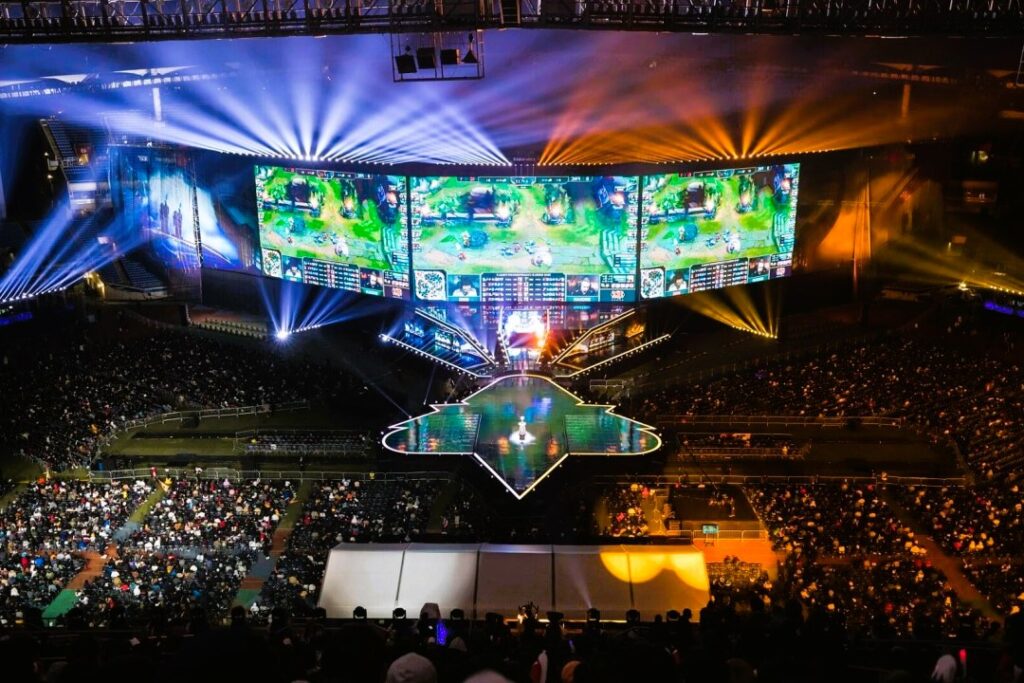In recent years, esports has emerged as a dominant force in the world of competitive gaming, transforming from a niche hobby into a mainstream phenomenon that captivates millions of fans worldwide. With its rapid growth in popularity, esports has not only redefined the landscape of competitive gaming but has also become a lucrative industry that rivals traditional sports. This article delves into the rise of esports, its impact on the gaming community, and what the future holds for this exciting new frontier.
The Rise of Esports
The origins of esports can be traced back to the early days of competitive gaming, where players would gather to compete in local tournaments. Titles like Space Invaders and Street Fighter II set the stage for organized competition. However, it wasn’t until the late 1990s and early 2000s that esports began to gain significant traction, thanks to the advent of online gaming and streaming platforms.
Key Milestones in Esports History
- Early Tournaments: The 1997 Red Annihilation tournament, where players competed in Quake, is often cited as one of the first major esports events. Players competed for a grand prize of a Ferrari, which showcased the potential for high-stakes competitions in gaming.
- The Birth of Major League Gaming (MLG): Founded in 2002, MLG played a pivotal role in professionalizing esports. By organizing tournaments for popular games like Halo and Call of Duty, MLG helped elevate competitive gaming to a new level.
- The Rise of Streaming Platforms: The launch of Twitch in 2011 revolutionized the way audiences engaged with esports. Gamers could now stream their gameplay live, allowing fans to watch their favorite players and teams in real-time. This created a vibrant community around esports, further fueling its growth.
- Mainstream Recognition: By the mid-2010s, esports had begun to attract the attention of major sponsors, media outlets, and traditional sports organizations. Events like The International for Dota 2 and the League of Legends World Championship garnered millions of viewers, showcasing the potential for large-scale esports tournaments.
The Esports Ecosystem

The esports ecosystem is vast and complex, encompassing various stakeholders, including players, teams, sponsors, and fans. Understanding this ecosystem is essential to grasp the full extent of esports’ impact on competitive gaming.
Players and Teams
Professional esports players are often highly skilled individuals who dedicate countless hours to mastering their craft. Many players start their journeys at a young age, honing their skills in casual gaming before transitioning to competitive play. Teams are typically formed around a core group of players, often with support staff such as coaches, analysts, and managers. Like our articles? Read also about The Rise of Indie Games.
Sponsorships and Monetization
As esports has grown, so too has its ability to attract sponsorships and investments. Brands see the potential to reach a young, engaged audience through esports partnerships. Sponsorship deals often include brand placements, merchandise collaborations, and advertising during tournaments.
In addition to sponsorships, esports organizations can monetize their efforts through merchandise sales, ticket sales for live events, and media rights deals. The lucrative prize pools offered in major tournaments also attract top talent, leading to fierce competition and thrilling gameplay.
Events and Tournaments
Esports events range from small local tournaments to massive international championships. Major tournaments often feature substantial prize pools, with some events offering millions of dollars in winnings. The spectacle of these events, complete with live audiences and high production values, rivals traditional sports competitions.
One of the hallmark events in esports is The International, the annual championship for Dota 2. With its record-breaking prize pool, The International has become a cultural phenomenon, drawing attention from gamers and non-gamers alike. Similarly, the League of Legends World Championship attracts millions of viewers, solidifying esports as a global entertainment powerhouse.
The Impact of Esports
Esports has had a profound impact on various aspects of society, from gaming culture to education and even healthcare. Its influence is felt across multiple domains:
Cultural Shift
The rise of esports has transformed the perception of gaming from a solitary pastime to a competitive and social activity. It has fostered a sense of community among players and fans, encouraging camaraderie and collaboration. Esports has also challenged traditional notions of sports, blurring the lines between physical and digital competition.
Educational Opportunities
Esports has entered the educational sphere, with many schools and universities now offering esports programs and scholarships. This shift acknowledges the skills developed through competitive gaming, such as teamwork, strategic thinking, and communication. Institutions are recognizing the potential of esports to engage students and foster a sense of belonging.
Career Paths
As the esports industry continues to grow, so too do career opportunities within it. Beyond professional players, individuals can pursue careers in event management, marketing, content creation, and broadcasting. This diversification has created a new job market for those passionate about gaming and esports.
Health and Wellbeing
While gaming has faced criticism for its potential negative effects, esports organizations are increasingly focusing on player health and wellbeing. Many professional teams implement wellness programs, emphasizing physical fitness and mental health. This holistic approach aims to create a sustainable environment for players, recognizing the importance of balance in competitive gaming.
The Future of Esports

The future of esports looks promising, with continued growth anticipated in several areas:
Technological Advancements
As technology evolves, so will the esports experience. Innovations such as virtual reality (VR) and augmented reality (AR) have the potential to reshape how players and fans engage with competitive gaming. These advancements could lead to immersive experiences that enhance the excitement of esports events.
Global Expansion
Esports is gaining traction worldwide, with emerging markets in regions like Southeast Asia, Latin America, and Africa. As internet access improves and gaming becomes more accessible, these regions are likely to see significant growth in esports participation and viewership.
Regulation and Governance
As esports matures, the need for regulation and governance will become more pressing. Establishing standards for player contracts, tournament organization, and anti-doping measures will help ensure the integrity of the industry. This regulatory framework can enhance the credibility of esports and foster a safer environment for players and fans.
Esports has undeniably become the new frontier of competitive gaming, capturing the hearts and minds of millions around the globe. Its rise has transformed the gaming landscape, creating new opportunities for players, fans, and brands alike. As the industry continues to evolve, the impact of esports on culture, education, and career paths will only grow. The future is bright for esports, and it promises to be an exciting journey for all those involved.
For more information on esports and its impact, check out the detailed entry on Wikipedia.

